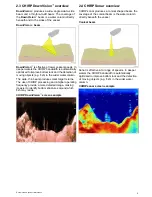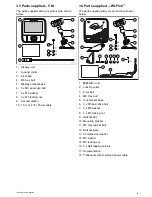
4.4 Testing and adjusting the
transducer
Once the initial mounting procedures have been
carried out, the transducer must be tested prior to
finishing the mounting.
The testing should be carried out with your vessel
in the water, with a depth greater than 0.7 m (2.3
ft) but less than the maximum depth range of the
transducer.
Important:
The Sonar channel will be able to
maintain readings at higher vessel speeds and at
greater depths than the
DownVision
™
application.
1. Press and hold the
Power
button to power the
unit on.
2. Complete the Start-up wizard and tutorial.
3. Open the relevant application.
The bottom should be visible onscreen and a
depth reading displayed.
4. Start moving your vessel at a low speed, ensuring
you have a depth reading and a clear image is
displayed.
5. Gradually increase the vessel speed whilst
checking the display, if the image becomes poor
or the bottom is missing at lower speeds then the
transducer needs to be adjusted.
6. Angle and height adjustments should be made in
small increments and re-tested each time until
you obtain optimum performance.
D13195-1
D13196-1
7. Loosen the ratchet arm bolt to adjust the
transducer angle.
8. Loosen the 2 mounting bracket screws to adjust
the transducer height.
9. Re-tighten the ratchet arm bolt and mounting
screws before re-testing.
Note:
• It may not always be possible to obtain depth
readings at higher speeds due to air bubbles
passing under the transducer.
• It may be necessary to make several
adjustments to the transducer before obtaining
optimum performance.
• If the transducer requires repositioning ensure
all old holes are filled with marine grade sealant.
Removing the transducer
The transducer can be released from the bracket by
inserting a small metal rod such as a paperclip into
the transducer release hole located as shown.
D13189-1
1. Insert the metal rod into the transducer release
hole.
2. Slide the transducer off of the bracket.
32
Dragonfly–4 / Dragonfly–5 / Dragonfly–7 / Wi–Fish






























